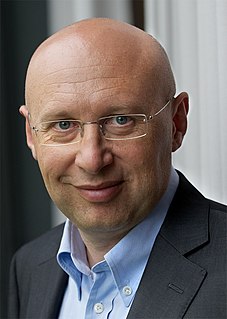A Quote by Stefan Hell
According to the belief, molecules closer together than 200 nanometers could not be told apart with focused light. This is because, in a packed molecular crowd, the molecules shout out their fluorescence simultaneously, causing their signal, their voices, to be confused.
Related Quotes
Suppose that you could mark the molecules in a glass of water; then pour the contents of the glass into the ocean and stir the latter throughly so as to distribute the marked molecules uniformly throughout the seven seas; if then you took a glass of water anywhere out of the ocean, you would find in it about a hundred of your marked molecules.
The words are strung together, with their own special grammar-the laws of quantum theory-to form sentences, which are molecules. Soon we have books, entire libraries, made out of molecular "sentences." The universe is like a library in which the words are atoms. Just look at what has been written with these hundred words! Our own bodies are books in that library, specified by the organization of molecules-but the universe and literature are organizations of identical, interchangeable objects; they are information systems.
My aging body transmits an ageless life stream. Molecular and atomic replacement change life's composition. Molecules take part in structure and in training, countless trillions of them. After my death, the molecules of my being will return to the earth and sky. They came from the stars. I am of the stars.
Why are atoms so small? ... Many examples have been devised to bring this fact home to an audience, none of them more impressive than the one used by Lord Kelvin: Suppose that you could mark the molecules in a glass of water, then pour the contents of the glass into the ocean and stir the latter thoroughly so as to distribute the marked molecules uniformly throughout the seven seas; if you then took a glass of water anywhere out of the ocean, you would find in it about a hundred of your marked molecules.
The neuro-biology of playing a musical instrument is completely scientific, but it’s also an absolute miracle, that you’re taking basically a calcium bucket filled with salt-water that’s run by a weak electrical signal, and you’re using it to move your flesh around in order to manipulate an instrument which disturbs air molecules between you and the listener, and then the listener’s ears picks up those disturbed air molecules which generates a weak electrical signal to their calcium bucket full of salt water, and they feel a feeling. That’s miraculous, and that’s where I live.
I have lived much of my life among molecules. They are good company. I tell my students to try to know molecules, so well that when they have some question involving molecules, they can ask themselves, What would I do if I were that molecule? I tell them, Try to feel like a molecule; and if you work hard, who knows? Some day you may get to feel like a big molecule!

































